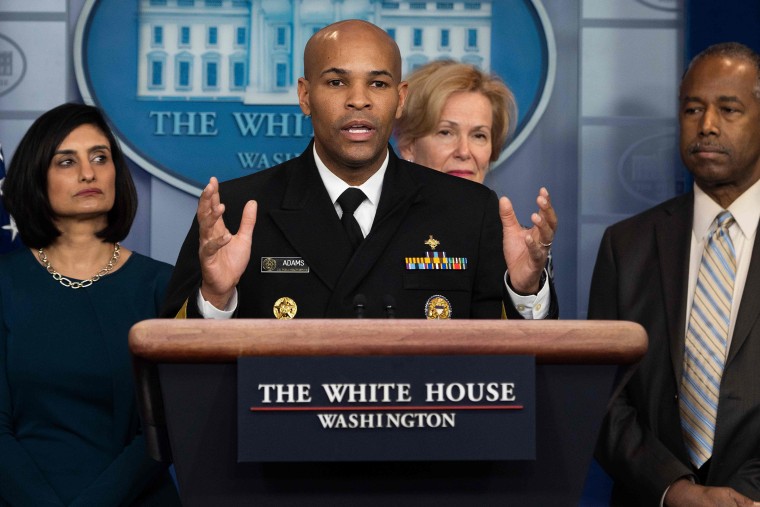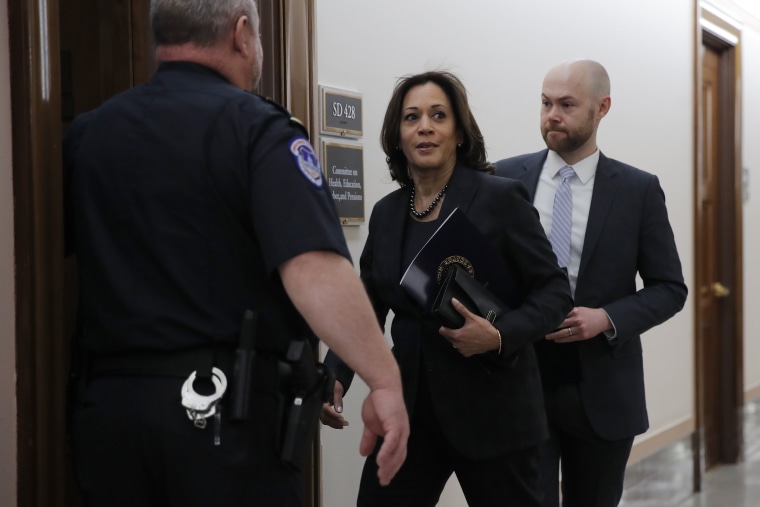During an NAACP emergency virtual town hall this week, former presidential candidate Sen. Kamala Harris, D-Calif., implored people of color to support a Senate bill that would provide paid sick leave for all workers during the coronavirus outbreak.
"Two-thirds of low-income workers don't have paid sick leave," Harris said. "Forty percent of these workers are black or Latino. People shouldn't have to choose between staying home and taking care of their babies.”
"Please join me in putting pressure on the U.S. Senate and Mitch McConnell, the leader, to say we cannot delay to have this vote," Harris said.
The Coronavirus Emergency Bill, which passed the House on Saturday, offers free testing, food assistance, unemployment benefits and some paid leave to the most vulnerable workers. President Donald Trump has said he supports the bill and the Senate is expected to pass it this week. Trump declared a national emergency on Friday as the number of coronavirus cases in the United States passed 5,000 and the death toll climbed to at least 100.
Some 20,000 callers listened by teleconference to the town hall that featured Harris, U.S. Surgeon General Jerome Adams and other health, policy and religious leaders speak about the impact of the coronavirus on communities of color.
Harris was the first speaker to mention the government's response to Hurricane Katrina as a cautionary tale, reminding callers that after the storm hit New Orleans in 2005, desperately needed assistance to the black and poor community arrived late. Such inequitable treatment has now resulted in many people not trusting government officials and the medical system, Harris and others said.

"I hope I can earn your trust," Adams told the town hall audience of callers, offering a brief bio as proof that he understands vulnerability.
"I grew up in a rural white community. My brother is incarcerated. I take eight medications and my mother had a major stroke last year," Adams said. "Personally, I have faith I was put where I was needed. I promise you I am in there fighting for people disadvantaged like me and my family were growing up." Adams suffers from asthma and other chronic health conditions, according a spokesperson for the Surgeon General.
New York, Los Angeles and Washington state have all announced that public buildings will be shut temporarily. And on Sunday, the Centers for Disease Control and Prevention recommended that no gatherings of 50 people or more be held, including sporting events, weddings, concerts and festivals, to slow the spread of the virus.
During a question-and-answer session, "Ryan of Denver" asked, "When will we start testing everyone?"
Adams admitted that testing "has not gone as we would like for it to have gone." But he explained, "It is important to understand our health care system and the CDC was never designed to have a government-led testing of hundreds of thousands of people."
The surgeon general said testing will increase over the next week or two. "We will have more hospitals and commercial and private labs providing testing on a local level. I believe we are at a turning point."
The speakers repeatedly said the bill in Congress offering free testing and paid sick leave should be considered just "a beginning" in addressing the needs of fragile communities, where there are long-term challenges with food insecurity, transportation and health care.
"For the NAACP, we are most concerned with the most vulnerable in our community," said the organization’s president, Derrick Johnson. "In addition to that, we are concerned with the equity as we see the recovery roll out."
